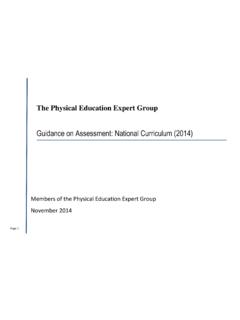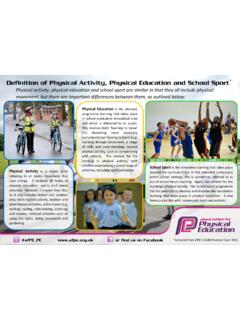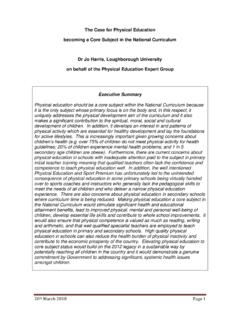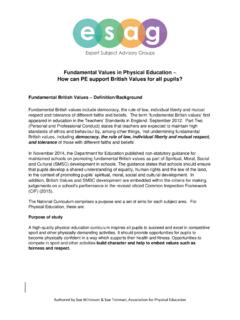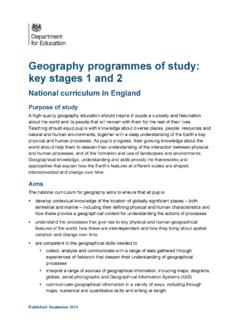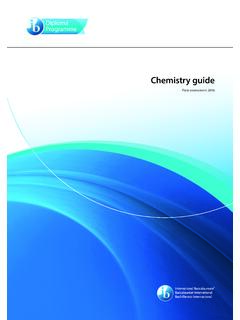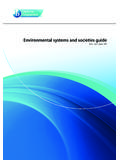Transcription of The Case for Physical Education becoming a Core Subject in ...
1 20th March 2018 Page 1 The Case for Physical Education becoming a Core Subject in the National curriculum Dr Jo Harris, Loughborough University on behalf of the Physical Education Expert Group Executive Summary Physical Education should be a core Subject within the National curriculum because it is the only Subject whose primary focus is on the body and, in this respect, it uniquely addresses the Physical development aim of the curriculum and it also makes a significant contribution to the spiritual, moral, social and cultural development of children. In addition, it develops an interest in and patterns of Physical activity which are essential for healthy development and lay the foundations for active lifestyles. This is increasingly important given growing concerns about children s health ( over 75% of children do not meet Physical activity for health guidelines; 20% of children experience mental health problems; and 1 in 5 secondary age children are obese).
2 Furthermore, there are current concerns about Physical Education in schools with inadequate attention paid to the Subject in primary initial teacher training meaning that qualified teachers often lack the confidence and competence to teach Physical Education well. In addition, the well intentioned Physical Education and Sport Premium has unfortunately led to the unintended consequence of Physical Education in some primary schools being virtually handed over to sports coaches and instructors who generally lack the pedagogical skills to meet the needs of all children and who deliver a narrow Physical Education experience. There are also concerns about Physical Education in secondary schools where curriculum time is being reduced. Making Physical Education a core Subject in the National curriculum would stimulate significant health and educational attainment benefits, lead to improved Physical , mental and personal well-being of children, develop essential life skills and contribute to whole school improvements.
3 It would also ensure that Physical competence is valued as much as reading, writing and arithmetic, and that well qualified specialist teachers are employed to teach Physical Education in primary and secondary schools. High quality Physical Education in schools can also reduce the health burden of Physical inactivity and contribute to the economic prosperity of the country. Elevating Physical Education to core Subject status would build on the 2012 legacy in a sustainable way by potentially reaching all children in the country and it would demonstrate a genuine commitment by Government to addressing significant, systemic health issues amongst children. 20th March 2018 Page 2 This paper presents the case for Physical Education becoming a core Subject within the National curriculum in England alongside English, mathematics and science.
4 Core subjects are generally considered to lay the foundation for learning in other subjects and, as a result, are generally advantaged in terms of their status, preparation for teaching, and their time and resource allocation in schools. As a consequence, key foundation subjects such as Physical Education tend to be marginalised and squeezed in terms of time and resource. This has led to a narrowing of the curriculum , concerns about which have been expressed by Ofsted (2017), and to an undermining of the intended broad and balanced curriculum (Boyle & Bragg, 2006) which was created to promote the spiritual, moral, cultural, mental and Physical development of pupils and of society and to prepare pupils for the opportunities, responsibilities and experiences of later life (Department for Education , 2013). In relation to the above stated aims of the curriculum , there is a strong case to be made for Physical Education becoming a core Subject in the National curriculum .
5 Firstly, it is the only school Subject whose primary focus is on the body and the development of Physical competence to ensure that children can move efficiently, effectively and safely. In this respect, it uniquely addresses the Physical development dimension of the curriculum . In addition, it makes a significant contribution to spiritual, moral, cultural and mental development (Bailey et al., 2009; Cale et al., 2016; International Council of Sport Science and Physical Education (ICSSPE), 2010). For example, high quality Physical Education has been shown to: contribute to children s confidence, self-esteem and self-worth; enhance social development by helping children to co-operate and compete and to develop a sense of fairness, justice and respect; reduce symptoms of anxiety and depression; benefit cognitive function and academic achievement; and encourage school attendance and engagement (Harris & Cale, 2018; ICSSPE, 2010).
6 A high quality Physical Education curriculum can, therefore, enhance children s spiritual, moral, social and cultural development and make a significant contribution to the promotion of fundamental British values ( democracy, respect and tolerance) and the development of essential life skills ( resilience, communication and responsibility), all of which add to the quality of life and maximise employability. Furthermore, high quality Physical Education develops an interest in and patterns of Physical activity which are essential for healthy development and which lay the foundations for healthy lifestyles (ICSSPE, 2010). Indeed, curriculum Physical Education is the most effective and inclusive means of providing all children with the skills, attitudes, values, knowledge and understanding for lifelong participation in Physical activity.
7 The latter is becoming increasingly important, given escalating concerns about children s health. For example, the recent Health Survey for England (2017) reported 16% of 2-15 year old children and one in five aged 11-15 to be obese. Furthermore, obesity is associated with health conditions such as type 2 diabetes, and the number of young people in the UK with this condition is increasing. In addition, recent findings from the Health Behaviour in School-aged Children cross national survey reveal worrying trends concerning many teenagers health and health behaviours (including obesity levels, eating habits and Physical activity), with UK youngsters lagging behind their European counterparts in many areas (World Health Organisation, 2017). 20th March 2018 Page 3 Indeed, concerns have been expressed for some time about the low activity levels of the vast majority of children with only 20% of girls and 23% of boys in England meeting health guidelines for Physical activity of at least one hour a day of moderate Physical activity; also, the proportion of both girls and boys who meet this guideline has decreased between 2008 and 2015, with this being more marked amongst the oldest age group (Harris & Cale, 2018).
8 There are also growing concerns about children s mental health, with 20% of children experiencing mental health problems, 10% being diagnosed with a mental health disorder (World Health Organisation, 2005) and the UK ranking 20th in life satisfaction scores internationally (Association for Young People s Health, 2017). Such concerns about children s health and Physical inactivity make this call for Physical Education to become a core Subject in the National curriculum particularly timely. There are also currently a number of issues with Physical Education in schools. For example, there is clear evidence that primary school teachers are not adequately trained to teach Physical Education and consequently many lack the confidence and competence to teach the Subject well (Harris et al., 2012; Tsangaridou, 2012). Also, for two consecutive years (2016 and 2017), Ofsted has reported that online trainee questionnaires reveal that the confidence and knowledge required to teach Physical Education well is a negative aspect of primary initial teacher training.
9 The above situation has arguably arisen because of a combination of factors, including: the limited amount of time given to Physical Education in initial teacher Education (and additional issues such as few opportunities to teach the Subject and be developed by Subject experts); the over-emphasis on literacy, numeracy and test performance in many primary schools; and squeezed school budgets, all of which tend to limit the status of the Subject and to push much-needed relevant professional development well down the pecking order . Furthermore, the well intended Physical Education and Sport Premium funding which was designed to improve the provision of Physical Education and sport in primary schools in England has seemingly had the unfortunate unintended consequence of virtually handing over the Subject to non-qualified teachers (in the form of sports coaches and instructors) with often relatively low level qualifications, limited knowledge of pupils, and minimal understanding of key pedagogical issues such as inclusion, progression and assessment (Griggs, 2010, 2016; Jones & Green, 2015; Smith, 2015).
10 Whilst there is clearly merit in schools developing partnerships with high-quality sports providers as they can make a significant contribution to upskilling teachers technical knowledge and there are examples of good practice in this regard ( the Football Association working with the Premier League supporting the quality development of the Premier League Primary Stars programme), it is important that a key curriculum Subject such as Physical Education is designed and delivered by well qualified teachers. The shift towards the outsourcing of Physical Education is associated with the more general globalisation, privatisation and marketisation of Education and is increasingly commonplace in schools. This is a concern on many fronts. The quality of learning in Physical Education is seriously compromised by this and there is a somewhat hit and miss , postcode lottery approach to the Subject .

